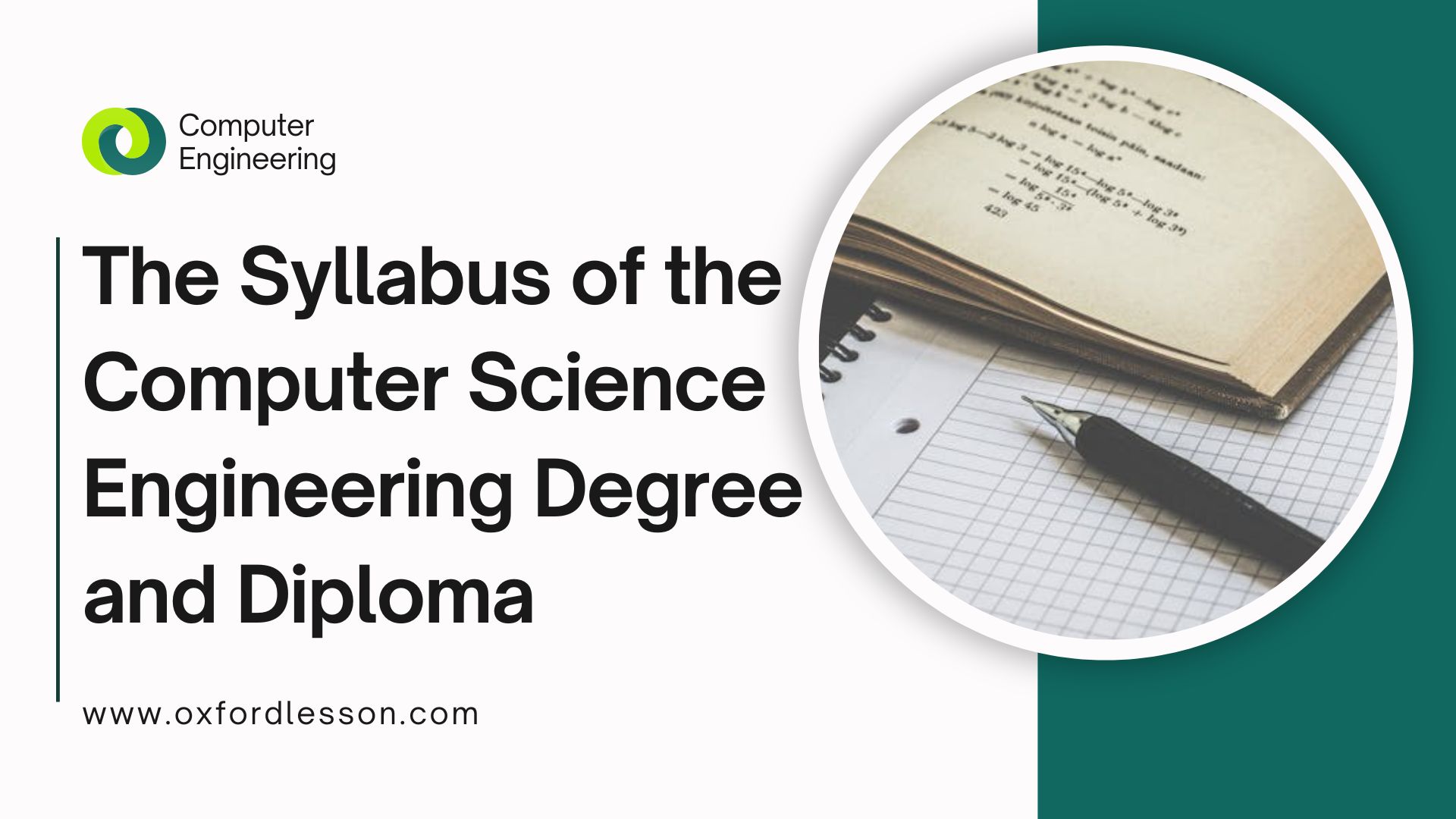My experience with this degree program gives you an accurate, currently updated, new syllabus and how we can enrol for this degree program with a very good understanding. We know that computer science engineering is a trending topic these days because technology is continuing to grow day by day. As an intelligent student, your choice is excellent for learning this field. In my previous article, I fully discussed the Computer Engineering degree and other areas. You can read it. In this article, I am only taking the syllabus for the computer science engineering degree and diploma.
The syllabus of the computer science engineering degree mainly focuses on how to implement and develop both software and hardware systems. At the end of the degree, you gain skills related to that. If you are interested in these key areas, no problem, start this journey. Both artificial intelligence and cybersecurity are trending technologies nowadays. For learning these fields, computer science engineering is very essential.
The Syllabus of the Computer Science Engineering Degree:
(Year-wise syllabus)
Computer Science Engineering- First year:
| Compulsory Subjects | Subjects’ Content |
| Communication Skills | · Presentations · Prepare Reports, etc.. |
| Electrical Measurements and Instrumentation | · Bridge Circuit · Earth Resistivity · ESR Circuit, etc.. |
| Communications and Computer Technology | · Accumulator Architecture · Machine Language · Modulation, IP address, etc.. |
| Electronics I | · Rectification · AC, DC Load Line · H-parameters and OP amp, etc.. |
| Introduction to Electrical Engineering | · Phasor diagram · Electromagnetism · Electrical energy, etc.. |
| Software Development for Engineers | · C, HTML, CSS · Pseudo code, flow chart · ER diagram, etc.. |
| Fluid Mechanics and Thermodynamics | · Gas Laws, continuity equation · Thermodynamic process · Bernoulli’s principle, energy eq, etc.. |
| Introduction to Engineering Design Graphics | · Angle projections · Sketchometry · Engineering drawing, etc.. |
| Engineering Mathematics I | · Logics, Functions · Matrix, Sequences · Differential equations, etc.. |
| Engineering Mathematics II | · Statistics, Probability · Vectors, complex numbers · Numerical methods, etc.. |
| Introduction to Object-Oriented Programming | · OOP concepts · Array · Keywords, etc.. |
Computer Science Engineering- Second year:
| Compulsory Subjects | Subjects’ Content |
| Economics and Marketing for Engineers | · Short notes · Essay related to marketing · Calculation, etc.. |
| Workshop Practice | · Wiring · Welding · Machine operations, etc.. |
| Circuit Theory and Design | · Circuit theories · Circuit analysis · Open, short circuit test, etc.. |
| Electrical Power | · Electricity transmission · Electricity tariff · AC, DC motors, etc.. |
| Data Structures and Algorithms | · Data structures · Pseudocode algorithms · Dijkstra’s algorithm etc.. |
| Software Engineering Concepts | · Bartex system · Database structure · Normalization, etc.. |
| Microprocessors and Interfacing | · Interfacing diagram · Flowchart · Assembly language, etc.. |
| Electronics II | · AC, DC equivalent circuit · Op amp · Wave form diagrams, etc.. |
| Group Project (Computer Engineering) | · Related to Computer Engineering |
| Engineering Mathematics III | · Functions · Partial differential · Linear equations, etc.. |
| Discrete Mathematics | · Mathematical inductions · System of congruence · Sets, etc.. |
| Object-Oriented Design and Programming | · Pattern in Java · UML diagram · Program in Java, etc.. |
| Industrial Training | · Related company electronic |
Computer Science Engineering- Third year:
| Compulsory Subjects | Subjects’ Content |
| Accounting for Engineers | · Calculations |
| Information Security | · Network infrastructure · SYN flow attack · PKI for web security, etc.. |
| Data Communications & Networking | · OSI model · Modulation · Encoded bit, etc.. |
| Operating Systems | · DPMA system · Pseudo code · Virtual devices, etc.. |
| Computer Architecture | · Processor design · Processor calculations · Computer organization, etc.. |
| Embedded Systems | · End-to-end architecture · Proposed system · Duty cycle, etc.. |
| Digital Electronic Systems | · ISSCU · VHDL testbench · ROM-based circuit, etc.. |
| Emerging Technologies | · Robotics system · AI areas · E-commerce system, etc.. |
| Engineering Mathematics IV | · Complex series · Maclaurin expansion · Fourier sin transformation, etc.. |
| Industrial Training (Computer Systems) | · Related computer system company |
| AI Techniques & Agent Technology | · Prolog program · Predicate logic · Intelligent agent, etc.. |
Computer Science Engineering- Fourth year:
| Compulsory Subjects | Subjects’ Content |
| Signals and Systems | · Power factor, Load factor · Power systems · Load frequency control system, etc.. |
| Compiler Design | · LR item · SLR parsing table · Code optimisation, etc.. |
| Advanced Computer Architecture | · Short vector instruction · Functional programming · On-chip interconnect network, etc.. |
| Management for Engineers | · Administrative management theories · HRM process · PESTEL analysis etc.. |
| Professional Practice | · Intellectual properties · Data protection · Social networking, etc.. |
| Processor Design | · VHDL instructions |
| Data Mining | · How to collect data from the scenarios |
| Engineering Research Project | · Related to computer engineering |
Note- This information is sourced from the Open University.
Here, consider the Bachelor of Science honours in Computer Science Engineering degree program. Look at that chart and get an idea about the degree program content. I think you can get a complete idea about that. If you have another problem, please comment below. I will reply to you immediately or give you a complete answer from the article.
Keep your mind before enrolling in this degree, you should pass their eligibility criteria(Entry qualification). What are the eligibility criteria? Before enrolling the a degree program, you should be qualified. These qualifications depend on your selected university.
The Syllabus of the Computer Science Engineering Diploma
This can be divided into the higher diploma level and the diploma level. Higher diploma level is better than a diploma. Any companies accept this qualification. Here, I consider the higher diploma level. A student can obtain a Higher Diploma as an intermediate award.
- Successful completion of all compulsory subjects at the selected engineering specialization.
- Fulfil the level-wise and category-wise minimum course credits.
- Pass all year 1 and 2 Compulsory courses, excluding Engineering Mathematics III.
At the end of these qualifications, Students are required to apply in a prescribed form and receive the Higher Diploma or the Degree.


